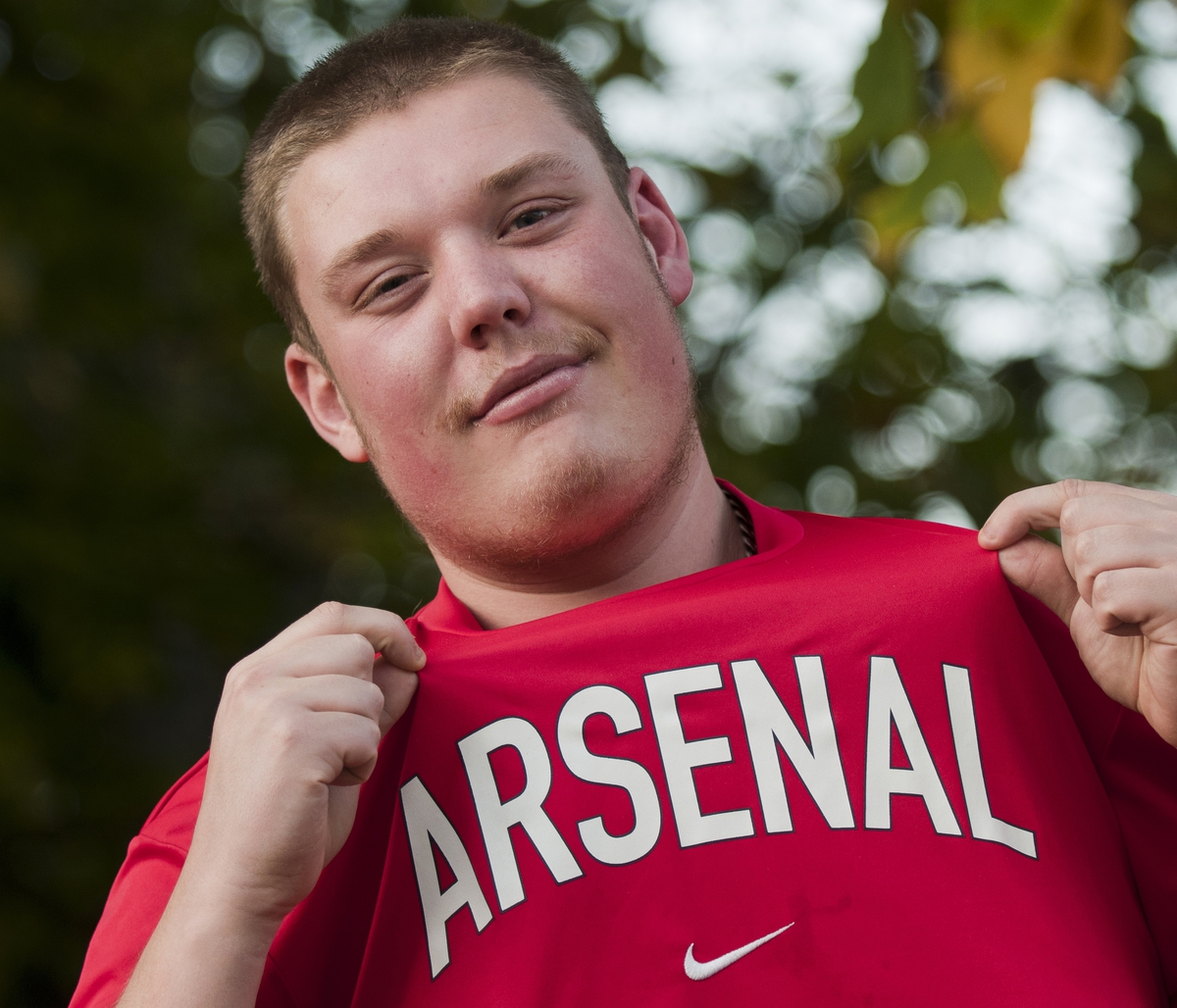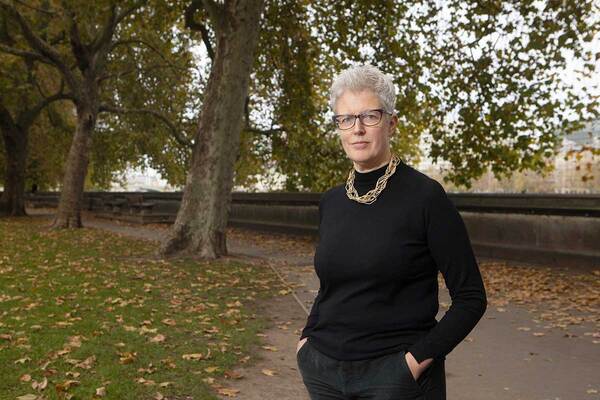Ms motivator
The number of young people out of work has hit a staggering 1 million. To give its unemployed tenants a helping hand, one landlord called Channel 4’s straight talking Fairy Jobmother. Words and photography by Simon Brandon
If anyone in the audience doubted they could kick themselves in the backside, Hayley Taylor’s demonstration will ensure they doubt it no longer.
‘Of course you can. Especially in these heels,’ she says, in a broad Doncaster accent, while proving that the manoeuvre is indeed physically possible. As visual metaphors go, it’s a perfect illustration of Ms Taylor’s philosophy.
She’s best known as Channel 4’s Fairy Jobmother, with her own series in which she frogmarches the long-term unemployed back into work after helping them face up to whatever has been stopping them from landing a job.
Today Ms Taylor is visiting a jobs fair in south west London, organised by 8,500-home Richmond Housing Partnership - but this visit is not, she insists, about any ‘airy-fairy TV stuff’.
The day-long event is held in a large hall in Twickenham, local employers, voluntary organisations, careers advisors and charities are rubbing shoulders with local jobseekers. Some businesses have come with vacant positions to fill; others are on hand to dish out free advice on CV writing or volunteering opportunities.
The 44-year-old fairy jobmother, who has 19 years’ experience helping people get off benefits and into work, first appeared on television more than two years ago in another Channel 4 series called Benefit Busters, which focused on the work of training firm A4e, where she was a tutor. Ms Taylor quickly caught viewers’ attention with her ‘take no prisoners’ form of compassion, which is certainly not to be confused with pity. So was her day with RHP a kick-ass success and can social landlords use events like these to provide real hope in their communities?
Practical approach
Throughout the event in west London she takes a series of sessions with groups of residents very similar to the ones she led during her Fairy Jobmother TV series, which saw her working with a different set of unemployed people in a different town or city each week.
‘I’m here to help people, to give them practical advice,’ she says. ‘I was so fascinated by this [event]. It’s why I came today. It’s addressing the barriers their [RHP’s] tenants face. That is what I found so inspiring.’
During the afternoon Ms Taylor gives a pep talk to a smaller group of around 12 older, unemployed residents. At one point, after listening to one man speak about his struggle to find work, his shoulders haunched, his words barely audible, she gets up, walks around the table, and puts an arm around his shoulders: ‘It’s not your fault,’ she repeats. ‘It’s not.’
Another member of the group begins to grumble - this session won’t do any good, he says, we’ve heard it all before - and elicits a very different response from the Fairy Jobmother.
‘I’m not saying this to criticise,’ she interrupts, ‘but your negativity is really holding you back.’
‘You don’t know how it feels,’ the man he replies.
‘I do know how it feels,’ she shoots back. ‘I’ve sat there crying in an interview, begging for a job.’
Throughout the day, in fact, there isn’t a comment or a question Ms Taylor doesn’t handle with ease. Her confidence and passion are infectious. After each of her sessions there is a queue of visitors waiting for some face-to-face time. Most want help with their CVs, she says afterwards, but I hear a few ‘thank yous’ as well.
‘I knew Hayley was going to come today,’ says Stephane Ouzeau, a 56-year-old cameraman and RHP tenant who has been unemployed for seven years. ‘She gives a lot of hope and pushes people. When you lose your job, you lose your confidence. A lot of people suffer when they have no qualifications and no experience, and she gives them confidence.
Making connections
This event - which cost £10,500 to run, with £7,000 coming from RHP, £2,000 from Richmond Council, £1,000 from housing association London & Quadrant and £500 from Thames Valley Housing - is an example of how housing providers are helping residents find work. A lack of unemployment opportunities is one of the main reasons cited for the frustration and alienation felt by those who were involved in the rioting and looting that spread across England in August.
Inside Housing is working with the Chartered Institute of Housing and the National Housing Federation to look at ways the sector can prevent similar riots occurring as part of The Riot Report.
Social landlords like RHP are finding ways to connect with members of their communities, and this, the housing association’s inaugural jobs fair, seems to have been a success.
It was intended to be a one-off event, but if responses from the attendees are anything to go by, there will be more to come (see box: Meet the jobseekers). The landlord estimates 400 visitors have passed through the doors, while contractor Mears reports receiving 50 applications for the apprenticeship scheme it advertised at the fair.
But then you’d expect demand for services like this to be high. It’s no secret that times are tough and getting tougher. Figures released by the Office for National Statistics last week show that unemployment has reached 2.62 million, its highest level since 1994. One in five young people is out of work, with unemployment among 16 to 24-year-olds hitting 1.02 million.
Do it yourself
The Fairy Jobmother’s solution for jobseekers - both those on her TV show, which was watched by 1.49 million people, and the groups she is addressing in Twickenham - is a big dose of straight-talking self-help without any drippy platitudes. If you want it enough, she says, you can have it.
‘People can do it for themselves no matter what the economic climate is like,’ Ms Taylor says. ‘There are jobs out there. There are just more candidates, which means looking within yourself. It’s what is within people that stops them getting employment.’
The high attendance today proves there are plenty of unemployed people out there who don’t need to kick themselves in the backside. In fact, Ms Taylor says she ‘absolutely hates’ the characterisation of benefit claimants as scroungers, not least because it sidesteps the complexities of each individual’s circumstances.
‘Everyone who is unemployed has a barrier,’ says Ms Taylor, who now runs her own consultancy business and uses the word ‘barrier’ a lot. ‘Someone might have dyslexia, or a crap CV… or it might be they know it all, and that’s the bloody barrier.’
Her job is to find the barrier and to help the person over it. It’s tempting to think that given enough fairy jobmothers, and indeed enough job fairs run by social landlords using their contacts and community links, everyone could be taken care of. But the resources don’t exist.
Ms Taylor has particular concerns for school leavers. ‘You leave school at 16, then you realise the big bad world has nothing for you. For two years you don’t fit into any box,’ she argues. ‘You can’t even take a bar job, you are so restricted in what you can do - you have no experience, maybe no qualifications, so how are you going to get your foot in the door? In those two years the barriers go up and you get bitter.’
She argues for more preventative measures - teaching younger children, from 11 up, the ‘life skills’ that she believes are the key to employability and which have been ignored in our education system’s focus on academic results.
Ms Taylor mentions communication as an example. ‘I’ve seen kids write “U” instead of “you”, “2” instead of “two”,’ she says, aghast. ‘They can’t communicate. It’s those skills that will get these kids through life. They don’t always have to have qualifications if they have drive and passion and focus and enthusiasm. That’s worth more than a million qualifications.’
Building on success
Those RHP residents and locals who have come to Twickenham today are clearly benefiting from being given a helping hand. So it is a little surprising to hear the event is, as far as Ms Taylor knows, the first of its kind.
The housing association already runs its own skills centre, the Urban Academy, for young people who need training and employment information or advice, but it also wanted to run a ‘simple event that focused solely on employment’, says RHP chief executive David Done, explaining why it decided to host a day dedicated to helping local jobseekers. ‘We want to create practical solutions for people,’ he states.
‘We’re going to be building on it,’ adds Eddie Kelly, a spokesperson for the housing association, when it is over and deemed a success. ‘This is just the start for us, definitely.’
It certainly has the guest of honour’s approval. ‘This should be done by everyone,’ Ms Taylor says. ‘It should be a role model.’ And she knows a thing or two about them.
Meet the jobseekers

Peter Draper, 23
‘I’m here doing a placement with Suited and Booted [a charity that gives out free business clothes to jobseekers].
‘Finding work is hard these days. I’m a qualified gardener and I want to set up my own gardening business but I need money for equipment and the banks aren’t interested.
‘There needs to be more publicity about these job fairs. I guarantee if more young people knew about this they would be flooding in.
‘It’s been useful. I was chatting to the army guys - I’m going to apply [to join the Territorial Army] tonight.’

Jade Winterbottom, 25
‘It’s a vicious circle - you can’t get a job without experience, you can’t get experience without a job. I’m in the navy but I’m leaving in July next year so I’m seeing what is around. Obviously the unemployment figures you hear on the radio and on the TV are quite worrying.
‘There is a drive to encourage women to get into [trades]. We heard that today from the careers advisor [from Next Step, a publicly funded careers -advisory service] here. [The jobs fair] has been invaluable on how to sell yourself, how to present your CV. They even offered advice to me and I’m employed in the services.’

David Wright, 51
‘I’m jobless and I’ve been homeless for 15 months. I’ve been sleeping out, staying with friends.
‘I want to run drama groups for young offenders. I owned my own businesses for the past 10 years - the last time I worked with young people was nine years ago and they [employers] don’t want to know.
‘Being homeless is so hard - I might get an interview tomorrow but I’d be filthy. That affects your confidence. It’s shameful.
‘I volunteered in a charity shop for a while, but it’s been too long since I was employed. [The jobs fair today] has taken me a step further to getting employed.’

Yasmin Badawy, 27
‘I’ve come to find out about opportunities in painting and decorating. I’ve got an NVQ level 2 in it. I am working now, but not in painting and decorating.
‘Lakehouse [a contractor] is here - I’ve left an application with the company and I’ve got an application form from Mears [a contractor] too.
‘The last time I was doing painting and decorating was last year when I was doing an apprenticeship. So now I’m seeing if I can get back into it.’











